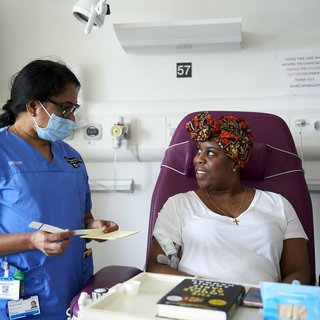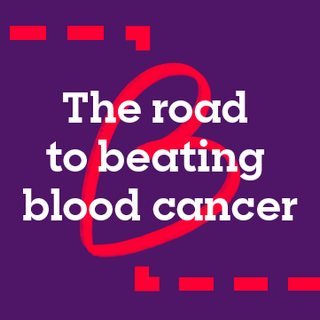A new class of drug is approved for myeloma in England and Wales
United Kingdom
The UK’s very first bispecific drug for myeloma, elranatamab has been approved by the National Institute for Health and Care Excellence (NICE) for restricted use.
Myeloma is a form of blood cancer that affects white blood cells called plasma cells. While most people diagnosed with myeloma are men, and most are over 70, people can be much younger when they are diagnosed.
Myeloma is a form of blood cancer which while currently incurable, can be treated.
- Gemma Trout, Support Nurse at Blood Cancer UK
Blood cancer is the fifth most common cancer in the UK and still around 4,500 develop myeloma every year.
A recent clinical trial of elranatamab shows the drug can increase the length of time people are in remission for their disease. This restricted approval from NICE will mean the drug will be available as a fourth-line treatment for some people with myeloma. It is only available as an alternative to other drugs, so will not be available to those who have received treatments like IsaPD – a combination of isatuximab (Sarclisa®), pomalidomide and dexamethasone.
Elranatamab will be available through the Cancer Drugs Fund. This fund provides people in England with faster access to the most promising new cancer drugs pending full approval from NICE. Now NICE have a three-year period before deciding whether to make it available permanently on the NHS.
Developing new types of treatment is important so we can treat those who don’t respond to other treatments.
- Gemma Trout, Support Nurse
Advances in bispecifics are set to be an active area of research and drug development in coming years.
But there’s still more to be done
NICE also rejected the treatment ‘IsaPD’ for permanent use on the NHS. It’s the first time a drug previously available through the Cancer Drugs Fund has been rejected for permanent use on NHS in England and Wales by NICE.
The NICE assessment deemed that it no longer meets the cost-effectiveness criteria that they measure drugs against, but it is available to those in Scotland, and it does not affect those currently on IsaPD in England, who will continue to receive their treatment.
The treatment is for those whose cancer has returned three times. And according to Myeloma UK, around 1,500 people have received benefit from the treatment through the Cancer Drugs Fund since it became available in 2020.


